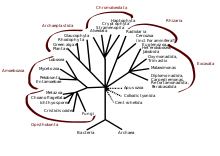Wikiology

Wiki information is not tabular (or sequential); it is structural like a tree, or a complex structure. Basic information usually expands to granular information, and ultimately to minutia. There are often layers, and from the lowest layers come support for the higher-level information: other wiki information, experiments (such wiki manifestations as models or findings within non-wiki studies), or obvious phenomena. Structures can be very small and can interrelate to information across a page, or can span many pages. Structured information that is highly-connected can resemble spaghetti; this occurs when information is highly-linked within a structure such as with a functional object.
Wikiology logically includes much of the object science as it has developed in recent decades as it has the class structure of object orientation, but related material should be expressed in wiki-style, which may not reflect initial intent!
Wiki building
[edit | edit source]Wikis:
[edit | edit source]- construct their own information at a high levels irrespective of information on single pages
- are constructive and collaborative in ways that were impossible prior to their evolution
- develop Science in ways that define it: a complex structure that explains all phenomena constructed from singular explanations for phenomena
Wiki-ize (or Wikify):
[edit | edit source]Wiki-byte-code is created from prose, such as verbal explanations or non-wiki text:
- original information can be mentally "core dumped" into any kind of text, or
- outside information can be collected in the normal way
Material can be deconstructed into a wiki-byte-code format of sparse structures:
- topic headings followed by
- explanations followed by
- bullets of subsidiary material, each having
- more explanations and links to supporting resources or other (or its own) wiki structures
Advantages of the process are that:
- structures are created
- plagiarism is prevented
- inquiry is promoted
Wiki-byte-code is:
- available to be re-constructed into prose by anyone
- easy to read allowing high rates of absorption
- information that can easily be:
- added
- removed
- re-ordered
- combined from different sources
- connected to other information
The disadvantage is that sentence structures are difficult to create such as those above. But proper sentence structure does not necessarily add to structure formation, just to its reflection. When properly formatted though, it is very attractive.
Making wiki pages
[edit | edit source]Pages can be built in two ways; they can be started from scratch, or material can be imported--but not duplicated. Since wikis are always in need of new material, then importing material makes sense, but the material has to be deconstructed and reassembled to make it unique. It also has to be supported.
A way of writing a wiki article is to paste large amounts of available material, and then disassemble it into key words, and then move the key words to the top of the document until nothing but the chaff of the original text remains. Then create headings followed by text followed by lists of attributes as bullets followed by descriptions and links to other wiki material and/or supporting sources. If the text needs to be further developed, then normal prose can be constructed from the text.
A small example
[edit | edit source]An incredibly influential model of higher mental functioning is Carl Rogers' 19 point theory of personality. It shows how Rogers translated the objective phenomenology of the pragmatists into the subjective client-oriented approach of the humanistic psychologists, which quickly became client-driven. In short, it is the relationship between self and experience that is mediated by "process". What we are doing here is a similar constructive, but is much more than "self," and is hence objective.
The link above contains all the information necessary to deconstruct the model (including the deconstructed text), but reconstruction would be an original wikification, and, as the "exercise" suggests, a huge contribution in communicating his well-proven model.
A large example
[edit | edit source]Mutual support for alcohol and substance abuse recovery is effective, we know it as Alcoholics Anonymous, or similar Narcotics Anonymous, and also the successful Oxford community support houses.
Here is writing that attempts to create a wide-scale research program leveraging smart phone "apps" and web servers running statistical (factor analysis) software.
I created the wiki style version to show how an actual functional model can be created from the old APA-style. The "2nd Cycle" section presents the ideas as a purely as a functional model with hints at Agile project style. Eventually I will post this to the site.--John![]() Bessatalk 17:15, 9 June 2011 (UTC)
Bessatalk 17:15, 9 June 2011 (UTC)
Wiki functional model structure (to be programmed) click
APA-style writing click
| “ | ABSTRACT: Self-efficacy in those attempting to recover from substance abuse disorders is believed to contribute to abstinence. Participation in mutual support groups is believed to reinforce self-efficacy by giving participants the opportunity to help others. Self-efficacy, as a component of the conceptual "system of self" works in conjunction with self-esteem to help goal achievement, or self-agency, which, for those with substance disorders, is abstinence. To reinforce research from previous largely qualitative studies, this study proposes to correlate self-efficacy and self-esteem as predictors of the rate of abstinence, or self-agency, of a group 30 men with a mean age of 30 who attend mutual support substance abuse programs. It is hypothesized that increases in self-efficacy and self-esteem will predict self-agency in terms of higher abstinence and lower drug craving, but that self-efficacy will be a greater predictor. The study also proposes to explore innovative data collection and statistical methodologies that leverage cell phones, the internet, and continuous online statistical analysis for the benefit of other researchers and those who want to manualize self-efficacy and self-esteem concepts in the group context for substance abuse recovery. | ” |
